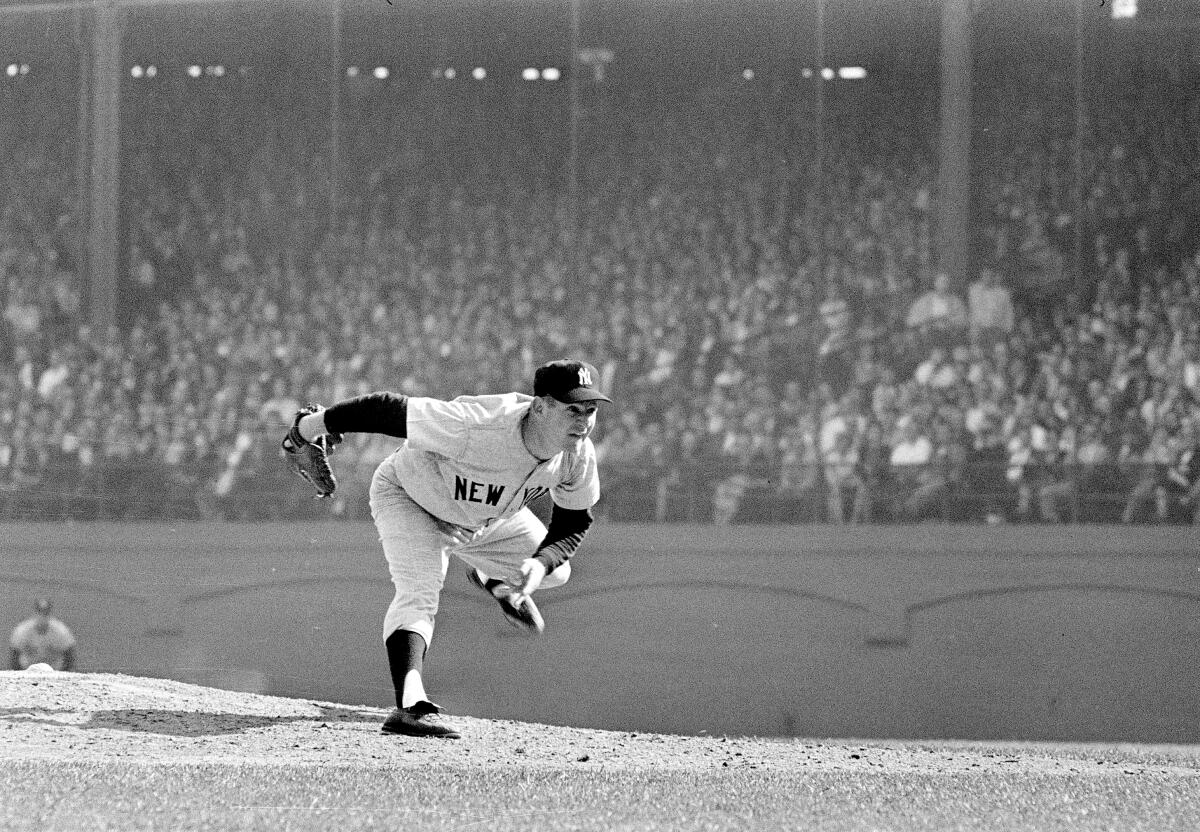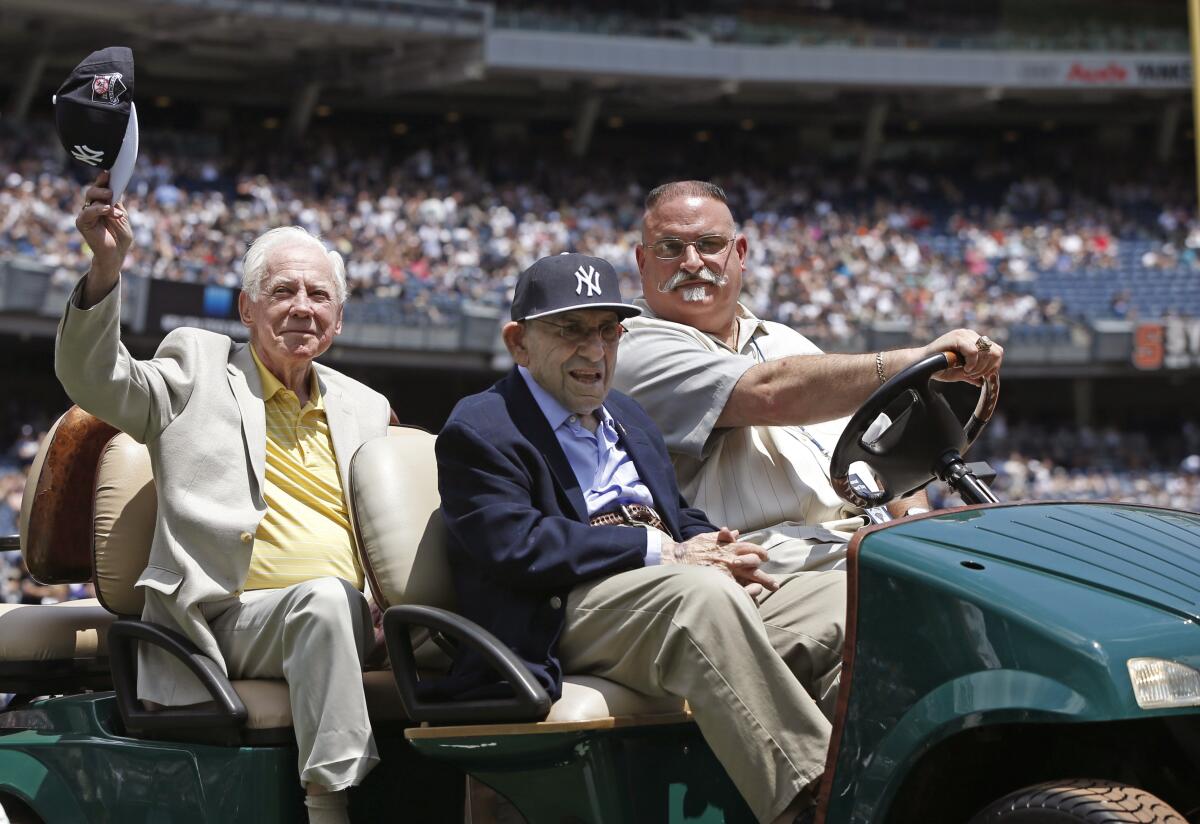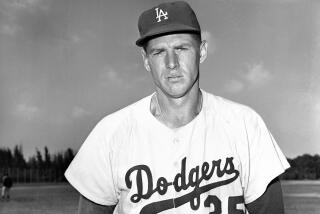New York Yankees pitching great Whitey Ford dies at 91

Whitey Ford, the New York Yankees’ Hall of Fame pitcher whose dominance during their frequent trips to the World Series in the 1950s and ’60s established him as one of baseball’s most reliable big-game performers, has died. He was 91.
A family member told the Associated Press on Friday that Ford died at his Long Island home Thursday night. The cause was not known.
The left-hander won 236 games in 16 seasons and the Yankees reached the World Series 11 times during his career, winning six titles. He won the Cy Young Award in 1961, the same year his teammate Roger Maris hit 61 home runs to break Babe Ruth’s single-season record. Ford was inducted into the baseball Hall of Fame in 1974, along with Yankees teammate Mickey Mantle.
Only 5 feet 10 and about 180 pounds, Ford baffled hitters with a variety of pitches.
“Ford was the only pitcher who really could embarrass a hitter. Honestly, sometimes he almost made me want to cry,” Jim Gentile, an All-Star first baseman who played in the 1950s and ’60s, said in former baseball commissioner Fay Vincent’s 2008 book “We Would Have Played for Nothing.” “It was the most frustrating experience I ever had in baseball.”
Brooks Robinson, the Baltimore Orioles’ Hall of Fame third baseman, told Sports Illustrated in 1961: “You never see anything good to hit.”

A 10-time All-Star, Ford won 10 World Series games, still a major league record. He became known as the Chairman of the Board for his ability to win big games. “If you only had one game to win and your life depended on it, you’d want him to pitch,” former Yankees manager Casey Stengel once said.
At one point Ford pitched 33 innings in World Series games without giving up a run.
“He was at his best in contests where the opposition might be a little tense or tight — because Whitey never was,” Times columnist Jim Murray wrote in 1974. “He could pitch his game in a haunted house.”
For many years Ford denied speculation that he threw a spitter or otherwise doctored the ball.
“There never has been a batter that accused me of using a spitter,” he told The Times in 1964. “Just the managers from 100 feet away.”
But in his 1987 memoir “Slick” written with Phil Pepe, Ford admitted that he learned to throw a “mudball” late in his career. He used saliva and dirt from the pitching mound. He also said he could scuff the ball using a ring.
Ford maintained he wasn’t cheating in 1961 when he won the Cy Young Award or in 1963 when he won 24 games. “Well, maybe just a little,” he wrote.
Edward Charles Ford was born Oct. 21, 1928, in New York. His father was a bartender and his mother a bookkeeper.
Ford, who mostly played first base for his sandlot and high school teams, attended a tryout at Yankee Stadium in 1946. A scout suggested Ford try pitching and showed him how to throw a curveball. After Ford’s team won New York City’s sandlot championships at the Polo Grounds, the Yankees signed him in 1947 for a $7,000 bonus.
He reportedly got the name “Whitey” for his blond hair from a minor league manager, former Yankees pitcher Lefty Gomez. Ford later suggested that his wife, Joan, also called him that when they were growing up together in Queens.
Ford reached the major leagues in 1950 and made an immediate impact with the Yankees, winning nine of 10 decisions. He won Game 4 of the World Series as the Yankees swept the Philadelphia Phillies.
He missed the 1951 and ’52 seasons after being drafted by the Army but pitched for the baseball and softball teams at his base in Fort Monmouth, N.J. When Ford returned to the Yankees in 1953, he won 18 games and started a streak with at least 11 victories in 13 consecutive seasons.

Ford also teamed with Mantle and infielder Billy Martin in years of late-night exploits. In the 2002 book “Mickey Mantle: America’s Prodigal Son” by Tony Castro, Mantle told of drinking with Martin and Ford: “Hell, we played mostly night games. We’d be home by 1 a.m. and sleep until 9 or 10.” Martin died in 1989, Mantle in 1995.
Ford’s best season was 1961, when he had a 25-4 record, a performance overshadowed by Maris and Mantle pursuing Ruth’s home run record. Mantle hit 54 home runs along with Maris’ 61 as the Yankees won another World Series title, defeating the Cincinnati Reds in five games. Ford was named the series’ most valuable player after pitching two of the Yankees’ four victories.
The Yankees reached the series the next three seasons but won only in 1962. They were swept by the Dodgers in 1963, with Ford losing twice to Sandy Koufax, and lost to the St. Louis Cardinals in 1964.
Ford won 16 games in 1965, but the Yankees’ era was ending.
He won only four games combined in 1966 and ’67 and retired in May 1967, after persistent arm problems. He stayed involved with the Yankees for many years, serving as a coach, scout, broadcaster and spring training instructor.
Ford’s survivors include his wife, the former Joan Foran; daughter Sally Ann; son Edward; and grandchildren. Another son, Thomas, died in 1999.
More to Read
Go beyond the scoreboard
Get the latest on L.A.'s teams in the daily Sports Report newsletter.
You may occasionally receive promotional content from the Los Angeles Times.










